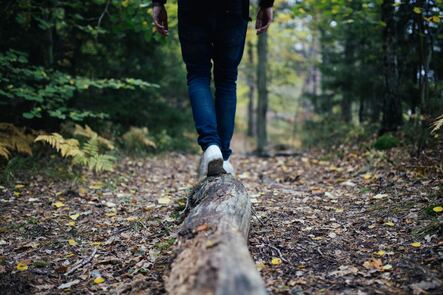Spending just two hours a week in nature will increase your health and wellbeing.
Did you know that spending just 10-20 minutes a day - outside, a few times a week - whether it be a park, a walk around the neighborhood, a trip to the local lake or just sitting in a wooded area-can increase your mental and physical well being? The sounds of nature like hearing birds or squirrels, breathing in fresh air, listening to the wind blowing through the trees and feeling a cool breeze on your face can be rejuvenating and help you feel refreshed. I'm sure we've all felt this way before after spending time outside, but there are other health benefits that may surprise you.
Here are 6 benefits to getting yourself out of the house and into nature.
1. We all know going on a hike is good for the heart, but did you know it's also great for the immune system? Walking through nature stimulates the senses by surrounding yourself with trees, bushes, flowers or natural springs, but it also has an affect on your internal health. Phytoncides are chemicals released by plants that you breathe in when walking in nature. These chemicals increase the levels of "natural killer" cells, which is the immune systems response to cancer. Walking outdoors and breathing in fresh air also helps lower stress hormones, which in turn boosts the immune system as well. These studies here, here and here demonstrate a positive immune reaction to spending time outdoors.

2.Research has shown that spending time in nature boosts creativity. The research was conducted at The University of Kansas, by researcher Ruth Ann Atchley. “Nature is a place where our mind can rest, relax and let down those threat responses,” said Atchley. “Therefore, we have resources left over — to be creative, to be imaginative, to problem solve — that allow us to be better, happier people who engage in a more productive way with others.” It's estimated that most of us have 60,000-80,000 thoughts a day. Spending time outdoors relaxes the mind and slows down our thoughts. This allows for new energy to emerge, new ideas and can spark creativity. This is also a perk of meditation and walking in nature can be seen as a form of "meditation".

This means being outside helps you increase your attention span and become more focused.
Since being in nature can make you feel refreshed and rejuvenated, it's no surprise that your creativity and focus get a boost! Nature helps replenish your energy, giving you inspiration. 3. The affects on health by hiking in nature, such as reducing stress and anxiety, boosting the immune system and relaxing your mind, also contribute to other really important brain performances. With increased focus and attention, comes improved memory and cognitive function. This study was led by Dr. Marc Berman at Baycrest's Rotman Research Institute. "Our study showed that participants with clinical depression demonstrated improved memory performance after a walk in nature, compared to a walk in a busy urban environment," said Dr. Berman. There was a 20% mental boost from walking in nature. Walking in nature improves memory, mood and also helps with depression." This is one of several studies that have shown the positive affects of nature walks on mental health, mood enhancement and memory improvement. 4. Being outside also helps improve eyesight. How so? It can reverse the effects of screen time by exposing your eyes to landscapes, forcing your eyes to focus both near and far, reducing nearsightedness. It's been theorized that bright light from the outdoors stimulates the release of dopamine in the retina. This initiates a molecular signaling that ends in normal growth of the eye, which combats nearsightedness. A study from the Journal of the American Medical Association was conducted on 6 year old children. They found that almost 40% of the children who did not spend much time outside ended up developing myopia, or nearsightedness. 
5. Being in the sunshine also has its own benefits. Just 15-20 minutes of sun to skin contact (depending where you live) provides an ample dose of vitamin D for your body.
Vitamin D is needed for strong bones, as it helps aid the absorption of calcium and phosphate. It also helps protect against chronic disease, including type 2 diabetes. Even on cloudy or overcast days, the UV rays can still peep down through the clouds, and there may be breaks of sunlight from time to time. So you can still get outside and soak up some vitamin D, just not at the fast rate that you would on a tropical island. You will need to spend some time outside, probably hours, on an overcast day in order to get your daily dose. 
6. And finally, spending time in nature can reset your circadian rhythm (inner clock). This study found that people who spent a weekend camping in mother nature fell asleep sooner, then woke up earlier in the morning.
After the weekend, they returned to their homes and continued to fall asleep sooner and sleep for a longer period of time. Why is resetting your inner clock so important? In order to regulate body temperature, hunger, hormone release and sleep/wake cycles, a person's circadian rhythm needs to be normal. Sleep disorders are the obvious consequence, but an abnormal circadian rhythm has been found by researchers to be connected to several illnesses including bipolar disorder, depressions, obesity, diabetes and seasonal affective disorder.
Spending time in nature has major benefits for our physical and mental well-being. To top it off if you are actually getting in physical activity and exercise, the benefits multiply. So the next time you are having a rough day or are feeling negative, take a walk outside and breath in the fresh air. It could be just what you need.
You May Also Like... |
Archives
February 2023
Archives
February 2023
Categories
All
AuthorKelly Cuip is a registered nutritionist, author, researcher, blogger and mother. |
Natural-Hacks Copyright © 2014-2022
Disclaimer: The information in the articles on this blog are strictly of the opinion of the author. The words and other content provided in this blog, and in any linked materials, are not intended and should not be construed as medical advice, as this blog does not provide diagnosis or treatment. This blog is strictly for educational purposes. Some pages may contain affiliate programs with links.




 RSS Feed
RSS Feed





